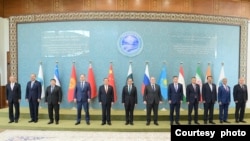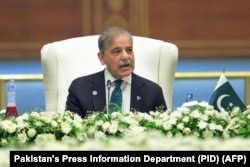Pakistani Prime Minister Shehbaz Sharif advocated expanding China’s Belt and Road Initiative (BRI) on Wednesday, saying it would enhance regional trade cooperation and promote "the vision of a connected Eurasia."
He delivered the remarks at the annual heads of government meeting of the Shanghai Cooperation Organization in Islamabad. Beijing and Russia established the SCO in 2001 as a way to counterbalance Western alliances in the areas of security, politics, and economics.
In his inaugural speech to the SCO huddle, Sharif hailed China’s investments in infrastructure projects in Pakistan as part of its global Belt and Road Initiative, or BRI, and called for its expansion.
“Flagship projects like the Belt and Road Initiative of President Xi Jinping, the China-Pakistan Economic Corridor…should be expanded, focusing on developing road, rail, and digital infrastructure that enhances integration and cooperation across our region,” he stated.
“Let us not look at such projects through the narrow political prism, and [instead] invest in our collective connectivity capacities, which are crucial to advancing the shared vision of an economically integrated region,” Sharif asserted, noting that 40% of the world’s population lives in SCO member countries.
Beijing launched the ambitious $1 trillion BRI, a global infrastructure and energy network, a decade ago to connect Asia, Africa, and Europe through new land and maritime routes.
The United States and other Western critics see the plan as a tool for China to expand its geopolitical and economic influence. They also criticize the Chinese investments, alleging they are burdening developing countries with unsustainable debt, charges Beijing rejects as politically motivated.
Last year, through the G7 framework, Western nations unveiled a $600 billion initiative to establish an alternative infrastructure development plan for connectivity.
The China-Pakistan Economic Corridor, known as CPEC, is a key BRI extension into Pakistan, building road networks, mostly coal-fired power plants and a deep-water port as well as an airport in the coastal city of Gwadar.
Chinese Premier Li Qiang and Russian Prime Minister Mikhail Mishustin were among the leaders from the 10-member grouping who attended Wednesday’s gathering, including host Pakistan, Belarus, Kazakhstan, Kyrgyzstan, Tajikistan, Uzbekistan, India, and Iran.
An official Chinese statement quoted Premier Li as stating during the SCO gathering in Islamabad that China "looks forward to working with all parties” to implement the outcomes of summits and “deepen cooperation in various fields, and promote the cohesion of the SCO, so as to make greater contributions to advancing regional peace, stability, and development.”
Analysts remain skeptical whether the SCO meetings have produced outcomes that would address the needs of member states, noting that Western alliances like NATO or the European Union offer members privileges such as mutual defense and economic integration.
Afghanistan
Pakistani authorities placed Islamabad under a security lockdown for the SCO meeting, deploying around 10,000 security forces, including troops, in and around the city to protect the high-profile event due to a recent surge in deadly militant attacks. Islamabad says fugitives linked to anti-Pakistan terrorist groups orchestrate the violence from sanctuaries in Taliban-controlled Afghanistan.
Sharif used his speech Wednesday to press the Taliban government, which is officially not recognized by any country, to address regional terrorism concerns, noting that stability in Afghanistan was essential for SCO member states to realize regional connectivity and trade opportunities fully.
“While the international community must extend the needed assistance to help the Afghan interim government in staving off the humanitarian crisis and preventing an economic meltdown, it must also demand from the Afghan Interim government to take concrete measures to promote political inclusivity, as well as to ensure that its soil is not used for terrorism against its neighbors, by any entity,” he stated.
Militant and separatist attacks have claimed the lives of more than 1,000 Pakistani civilians and security forces so far this year alone. Last week, two Chinese engineers were killed and another was injured when a suicide car bombing hit their convoy in the southern Pakistani port city of Karachi. The slain Chinese nationals were staff at a CPEC-built power plant.
The Taliban have repeatedly denied charges that foreign militants are using Afghan soil to threaten neighboring countries. They also dismissed international calls for giving representation to all ethnic and political groups in Afghanistan in their administration, called the Islamic Emirate. The Tabliban say they are governing the country in line with their strict interpretation of Islamic law.






